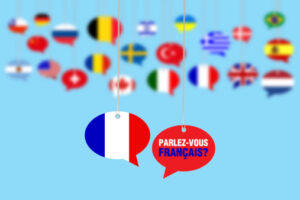Oh là là ! This well-known phrase is an example of a French exclamation: a word, sound or noise that we make to express an extreme emotion such as excitement, anger or happiness.
But what does oh là là mean? And have you been using it correctly when learning how to speak French?
Let’s check out the top 10 French exclamations, explore their meanings and learn to use them correctly.
1. Ah bon ? (Really?)
Our first exclamation contains a common sound from English: Ah.
Just as in English, this word expresses surprise. Combined with the French word bon meaning “good”, the expression has the non-literal meaning of “really?”
In this way, the speaker can express surprise at some learned fact and ask the listener to clarify. Take a look at the following example.
François: Marie s’est enfuie avec son amant pour se marier ! (Marie eloped with her lover!)
Delphine: Ah bon ? Je n’y crois pas. (Really? I don’t believe it.)
2. Aïe ! (Ouch!)
Getting injured is something that can happen no matter what language you speak. The French use the word Aïe to say “ouch.” Here’s an example of it in use!
Jacques: Aïe ! Je me suis cogné l’orteil contre le pied de la chaise. (Ouch! I stubbed my toe against the leg of the chair.)
3. Ouf (Phew)
In recent years, I’ve noticed English-speaking youths using a new exclamation: oof. It’s a way of expressing discomfort. There is actually an expression in French pronounced the same way, though it does not have the same meaning.
Instead, ouf in French translates more to the English word “phew!” In that sense, it expresses relief after some stressful or uncertain situation.
Amélie: Ouf ! J’ai fini le projet avant la date limite. (Phew! I finished the project before the deadline.)
4. Miam miam (Yum yum)
Who doesn’t love yummy food?
Well, in French, there is also a way to express that something tastes amazing. While we might say “yum yum” in English, the French say miam miam instead. Now you have the perfect caption for all your Instagram pictures of scrumptious French food!
François: Miam miam ! Cette soupe à l’oignon est délicieuse ! (Yum yum! This French onion soup is delicious.)
5. La vache ! (Holy cow!)
Sometimes French and English exclamations translate between each other almost perfectly. This is the case with la vache. It literally means “the cow,” and it expresses the same surprise and awe as the English exclamation “holy cow!” Not to mention, it is a pretty fun exclamation to say!
Delphine: La vache ! Cette femme court très vite. (Holy cow! That woman runs very quickly.)
6. Oups (Whoops / Oops)
Like la vache, our next exclamation has pretty much the same meaning as its English counterpart. The French exclamation oups means the same thing as the English words “whoops” or “oops.” This exclamation is used to express remorse after a mistake.
Amélie: Jacques ! Tu as oublié ton sac à dos pour l’école. (Jacques! You forgot your backpack for school.)
Jacques: Oups ! Je viens. (Whoops! I’m coming.)
7. Chut ! (Shh!)
What better way to get someone to be quiet than a universally-understood exclamation?
In English, we say “shh!” The sound is similar in French: the word chut starts with a “sh” sound followed by an “u” sound. Keep in mind: the final t in the word chut is silent.
Delphine: Chut ! Ne parle pas. J’essaie de lire et tu me distrais. (Shh! Don’t speak. I’m trying to read and you’re distracting me.)
8. Oh là là ! (Oh my!)
Are you still wondering about the phrase oh là là ? Well, this exclamation is actually a little more strange than it appears.
While in context the phrase means “oh my!” it literally translates to “oh there there.” But rather than having the same meaning of “there, there” in English, this exclamation instead expresses surprise or awe of something.
François: Oh là là ! Cette robe est belle. (Oh my! That dress is beautiful.)
9. Zut (alors) ! (Darn!)
Perhaps one of the more stereotypical and imitated French exclamations, zut is a way to express discontent or regret without using a French swear word. In that sense, it translates most closely to the English word “darn!”
The word alors (then, so) adds emphasis to this exclamation, and it is optional.
Jacques: J’ai laissé mon portable tomber. Zut alors ! (I dropped my phone. Darn!)
10. Hein ? (Huh?)
As in English, the French word hein ? isn’t the most polite way to express confusion, but in informal situations, it gets the point across.
Meaning the same thing as the English exclamation “huh?” it is a way to ask for repetition or clarification of something that is not quite understood. Be cautious, however. Using hein ? in a formal situation is seen as rude, so I would use the word pardon ? in its place in those types of situations.
Amélie: Hein ? Je n’ai pas entendu ce que tu as dit. (Huh? I didn’t hear what you said.)





